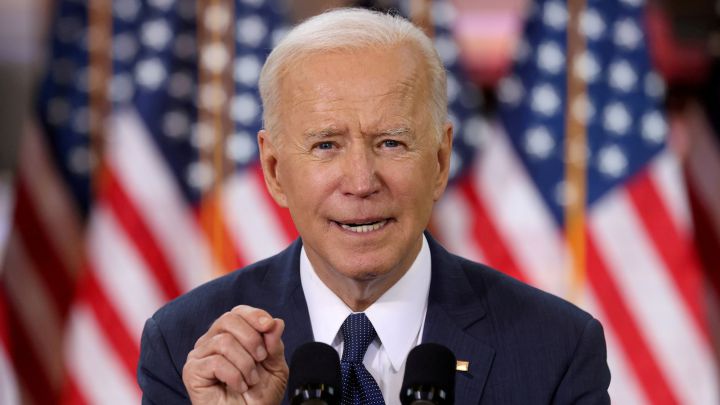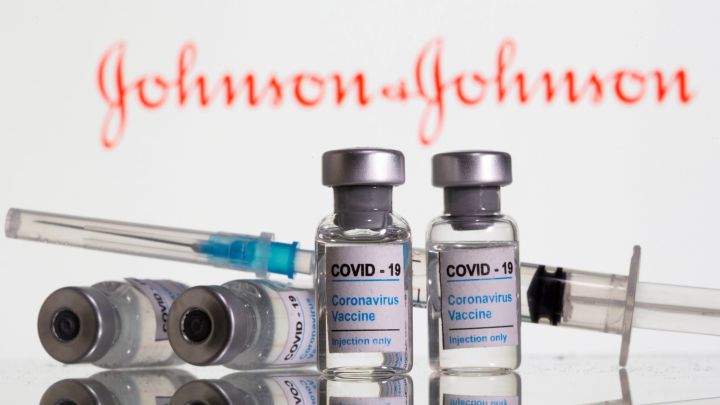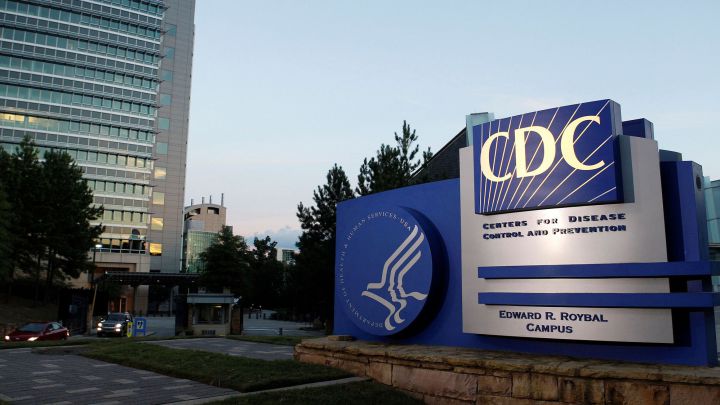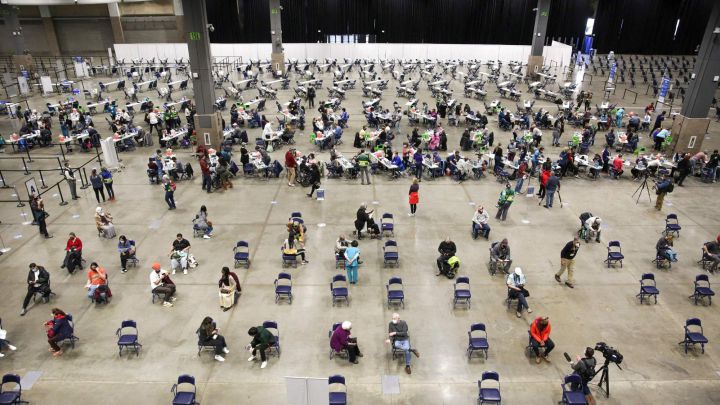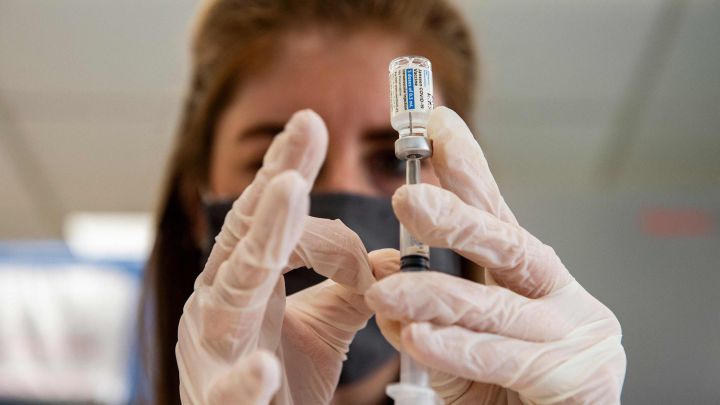Covid vaccine in the US news summary: 26 April 2021
Keep up to date with the latest United States vaccine news as all people 16 and older are now eligible for the coronavirus vaccine in every state.
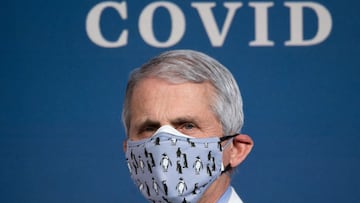
Show key events only
US covid-19 vaccine news: 26 April
Americans avoiding second vaccine dose
More than five million Americans did not get their second dose of the Moderna or Pfizer vaccines, according to a report released by the Centers for Disease Control and Prevention.
That’s about 8% of patients who received at least one vaccine and about double the percentage of people compared to a few weeks into the vaccine rollout.
“I got the Moderna shot,” said Makaila Tibbs, who raised concerns over receiving her second dose because of the Johnson & Johnson pause. “I got the first one. I still need to get my second one. The Johnson & Johnson does make me nervous, especially already having my first shot. It does make me skeptical.”
Read more:
How has the Biden administration been for the first 100 days of government?
Addressing the coronavirus pandemic was always going to be the first priority of Biden's presidency and his pledge to surpass 100 million vaccine doses in the first 100 days was comfortably beaten. His administration have passsed legislation providing funds needed to improve the rollout in rural communities.
But how many vaccine doses have been administered in total, and what other measures have been put in place to tackle covid-19?
$100 bond for vaccine recipients in WV
GOP Gov. Jim Justice of West Virginia has announced that the state will award those aged between 16 and 35 a savings bond worth $100 if they get the covid-19 vaccine. All states have hit President Biden's target to open up vaccine eligibilty for all adults, but some are sturggling to find enough people to get them.
The idea of a national incentive for vaccinations has been mooted in the past, including tying the stimulus check payment to the vaccine, but some lawmakers argued that it was unconstitutional.

New US Covid-19 infections drop sharply
New cases of Covid-19 in the United States fell 16% last week to about 409,000, the biggest percentage drop in weekly new cases since February, according to a Reuters analysis of state and county data.
Deaths from Covid-19 fell 4% to 4,972 in the week ended 25 April, dropping below 5,000 for the first time since October. Michigan still led the states in new cases per capita, though new infections fell 29% last week compared to the previous seven days. New cases also fell by over 20% in New Jersey and Pennsylvania, the states with the next highest rates of infection based on population.
New infections are still rising on a weekly basis in 12 out of 50 states, down from 30 states last month. The states with the biggest percentage increases are Tennessee, Oregon and Arizona. As of Sunday, 43% of the U.S. population has received at least one dose of a Covid-19 vaccine, and 29% was fully vaccinated, according to the Centers for Disease Control and Prevention.
Nationally, the pace of vaccinations fell 14% from the previous week to an average of 2.7 million shots per day. The average number of Covid-19 patients in hospitals across the country held steady at about 41,000, according to the Reuters analysis.
Can you now get the J&J vaccine in the US?
The United States has resumed use of the Johnson & Johnson covid-19 vaccination after health regulators lifted an 11-day pause. The vaccination’s use was temporarily suspended at the start of this month after reports of recipients suffering from rare blood clots.
Find out about the current situation with the J&J vaccine and where it is being used here:

Close to 29% of the US population is now fully vaccinated
The US Centers for Disease Control and Prevention gave the latest update on the nations Covid-19 vaccine rollout on Monday. The CDC report that a total of 140,969,663 people (42.5%) have now received at least one dose while 95,888,088, or 28.9% are fully vaccinated.
New Hampshire and New Mexico were the two states with the highest vaccine rate - with 83,097 and 83,289 doses administered per 100,000 people.

Vaccine pact between US, India, Japan and Australia still on track
A cooperation between the United States and three of its closest Indo-Pacific partners to supply up to a billion coronavirus vaccine doses across Asia by the end of 2022 was 'still on track', senior administration officials said on Monday, despite a surge of the virus in India, one of the countries involved. "It's moving forward expeditiously," a senior administration official told reporters in a briefing call.
In March, a Quad fact sheet said the United States, through its International Development Finance Corp, would work to finance Indian drugmaker Biological E Ltd to produce at least 1 billion Covid-19 vaccine doses by the end of 2022.
Coronavirus in the US: how many variants have there been?
Covid-19 variants have the scientific community worried but most mutations in its genetic makeup do not impact its ability to spread or lethality.
US urged to share vaccine surplus with Central America
The COVAX facility, a global multilateral initiative to ensure vaccine equality, has reached 100 economies worldwide but the global vaccination drive still faces challenges as the world's largest economies stockpile doses. The US is being urged to share its surplus with neighboring countries in the Central American region.
WHO expects decision on two Chinese COVID-19 vaccines
The World Health Organization expects to decide whether to give emergency approval for China's two main covid-19 vaccines in the next two weeks, Assistant Director-General Mariângela Batista Galvão Simão told a briefing on Monday.
Simão said the WHO could decide on a vaccine made by Sinopharm by the end of this week, and one made by Sinovac Biotech by the end of next week.
China has already deployed millions of doses of both vaccines at home and has exported them to many countries, particularly in Latin America, Asia and Africa.
An emergency listing from the WHO is an indication to national regulators of a shot's safety and efficacy, and would allow the Chinese vaccines to be included in COVAX, the global programme to provide vaccines mainly for poor countries.
If approved, the Chinese vaccines would be the first from a non-Western country to gain approval from the global health body. So far the WHO has given emergency approval to vaccines from Pfizer-BioNTech, AstraZeneca and Johnson & Johnson. It is also expected to review Moderna's shot this week.
US to share up to 60 mln AstraZeneca vaccine doses globally
The United States will start to share up to 60 million doses of the AstraZeneca Covid-19 vaccine doses with other countries as they become available, White House senior Covid-19 adviser Andy Slavitt said on Monday.
"US to release 60 million AstraZeneca doses to other countries as they become available," he wrote on Twitter. The Associated Press earlier on Monday reported the doses would be shared in coming months following a federal safety review. The Biden administration in March said it would send roughly 4 million of the drugmaker's vaccine to Canada and Mexico and is under growing pressure now to expand sharing of its stockpile with India and other countries.

Situation in India is "beyond heartbreaking" - WHO chief
The situation in India, where Covid-19 cases have surged, is "beyond heartbreaking", and the World Health Organization is sending extra staff and supplies there to help fight the pandemic, WHO chief Tedros Adhanom Ghebreyesus said on Monday.
"WHO is doing everything we can, providing critical equipment and supplies, including thousands of oxygen concentrators, prefabricated mobile field hospitals and laboratory supplies," Tedros told a briefing. He said he had already announced 2,600 extra WHO staff members were going to India to help support the effort to fight the disease.
More than 5m people have failed to get second vaccine dose
CDC data shows that more than 5 million people in the United States, or 8 percent of Americans. have failed to return to get the second dose of the COVID-19 vaccine. As it stands, 42% of the US population has received at least one dose of the coronavirus vaccine.
First case of male J&J vaccine recipient developing blood clot reported
The UCSF has reported the first US case of a male recipient developing a rare blood clot after taking the Johnson & Johnson vaccine.
The resumption of the rollout of the J&J vaccine was approved by US authorities this weekend following its suspension two weeks ago after 15 recipients of the jab developed blood clots. All 15 of those cases were women, most under age 50. Three died, and seven remain hospitalized.
The man, a resident of California's Bay Area, is reportedly doing well and is expected to leave hospital in the coming days.
Important to get U.S. vaccine help along border, Mexican official says
Mexico is ramping up requests for more COVID-19 shots from the United States, and in the coming days may ask for assistance vaccinating people along the countries' shared border, the Mexican government official in charge of vaccine diplomacy said.
Mexico has received 2.7 million doses of AstraZeneca's COVID-19 vaccine from the United States, but has not made progress on accessing larger U.S. stocks, deputy foreign minister for multilateral affairs Martha Delgado said in an interview with Reuters late last week.
"We are once again taking up dialogue to insist on this need," she said, ahead of an upcoming visit by Foreign Minister Marcelo Ebrard to the United States.
Mexico may also put forward a proposal to prioritize vaccination along its border with the United States, Delgado said, describing the issue as important and a concern in Mexico.
The proximity and human ties between populous towns and cities along the border means it is easy for the coronavirus to reinfect both sides. (Reuters)
AstraZeneca says EU legal action over COVID-19 vaccine supply is without merit
AstraZeneca on Monday said that legal action by the European Union against the pharmaceutical company over the supply of its COVID-19 vaccine was without merit and pledged to defend itself strongly in court.
"AstraZeneca has fully complied with the Advance Purchase Agreement with the European Commission and will strongly defend itself in court. We believe any litigation is without merit and we welcome this opportunity to resolve this dispute as soon as possible," AstraZeneca said in a statement. (Reuters)
228m vaccine doses now administered in the US
More than 228m doses of the coronavirus have now been administered in the US, as reported by CNN. Around 42% of the US population has now had at least one dose of the vaccine, while roughly 29% are fully vaccinated.
Worried about vaccine passports? 'Don't be'
Privacy concerns over covid-19 vaccine “passports” are overblown, argues Eric A. Feldman, a law professor at the University of Pennsylvania’s Carey Law School.
Evidence of vaccine status is a critical step in stemming the spread of covid-19 and reopening the economy, he says. Employers, businesses, and schools are on firm legal footing for requiring certification of vaccination or a valid medical or religious exemption.
Full story:
Vaccine questions answered: Olivia Colman
The English actress has won numerous accolades, including an Academy Award and three British Academy Television Awards.
Here she is answering some of your questions on the covid-19 vaccine.
Vaccine choice could determine future travel plans
With the resumption of global travel on the horizon, some people are discovering that their choice of vaccine could determine where they’re allowed to go.
Already, the European Union is planning to allow Americans vaccinated with shots approved by their drug agency to enter over the summer, European Commission president Ursula von der Leyen suggested in a New York Times interview Sunday.
This means that those who have shots by Chinese makers like Sinovac Biotech Ltd. and Sinopharm Group Co. Ltd. are likely to be barred from entry for the foreseeable future, with stark consequences for global business activity and the revival of international tourism.
Read more:
US trying to help India covid-19 disaster
Doctor Anthony Fauci has reiterated the stance in the United States that they will act as a global leader once again, most pressingly in an attempt to aid those countries struggling to cope with the spread of covid-19.
The message that has been repeated on myriad occasions that the pandemic is only crushed once it has been in every country.
After additional review, analysis and scrutiny, experts have concluded the Johnson & Johnson vaccine is safe, effective and will protect you against the covid-19 virus
J&J vaccine gets the OK in California
As we have been seeing in other parts of the country, the governors of California, Washington, Oregon and Nevada concluded on Saturday that the use of the Johnson & Johnson covid-19 vaccine is safe and should resume in the western states.
Independent scientists concluded the J&J vaccine is safe and effective, and that resumption of its use "will support covod-19 vaccine uptake, help reduce severe covid-19 illnesses and control the pandemic," the joint statement from the governors said.
The western states had their own scientists independently review the FDA’s actions related to covid-19 vaccines.
Vaccine hesitancy addressed by community outreach in Florida
Some Central Florida counties will host roundtable discussions as a way to expand access to covid-19 vaccine information. Some people just don’t want to get vaccinated, and that could impact local counties’ ability locally to reach what’s known as herd immunity.
In some local counties, demand continues to slowly decline.
Now in some parts of Central Florida, the mission is shifting even more people to smaller sites instead of the mass vaccination sites.
In addition to state-supported pop-up sites, Orange County is hosting two more mobile sites this week.
Brought to you by Deanna Allbrittin and James Tutten.
Vaccine data errors must be fixed: Texas focus
As the initial mad rush for covid-19 vaccines wanes, Texas is shifting its distribution strategy to focus on smaller providers, setting up a crucial test for the state as it attempts not only to get shots in arms but also to track that information accurately.
Over the past five months, Texas health officials have focused on allotting vaccines to mass vaccination sites, pharmacies, hospitals and local health departments that distribute thousands of doses a week - introducing a mammoth data collection effort that stressed the state’s already troubled reporting system. Officials say the new strategy will help target communities that have so far been hesitant to get shots by working with local pharmacies and public health organizations.
Full story from Cayla Harris and Jordan Rubio:
Moderna vaccine to be reviewed for WHO emergency listing
Moderna's covid-19 vaccine will be reviewed on April 30 by technical experts for possible WHO emergency-use listing, a World Health Organization spokesman told Reuters.
"We are discussing the Moderna covid-19 vaccine on Friday...," WHO spokesman Christian Lindmeier said in reply to a query. A decision on the US drugmaker's vaccine, now being evaluated under the abridged procedure on the basis of prior review by the European Medicines Agency, was expected in one to four days after that, Lindmeier said.
So far covid-19 vaccines made by Pfizer, AstraZeneca and Johnson & Johnson have received WHO approval, which is a signal to national regulatory authorities on a product's safety and efficacy.
The WHO committee of technical experts were on Monday reviewing the covid-19 vaccine of Chinese drugmaker Sinopharm and is due to review the Sinovac product at its next meeting on 3 May, according to the WHO.
Stephane Bancel, Moderna CEO, told an event last Friday that it was on track to make up to one billion doses of its covid-19 vaccine this year and 1.4 billion next year.
"We're in the final stretch to get an agreement with COVAX," Bancel said, referring to the vaccine-sharing facility run by the GAVI Vaccine Alliance and WHO to bring doses to lower income countries.
US and UK urged to export vaccines to poorer countries
The head of the World Trade Organization urged rich nations to export more covid-19 vaccines, singling out the UK and the US as she reiterated the need to ensure poor countries aren’t left behind if the world wants to get through the pandemic.
“Vaccine nationalism and inequity doesn’t work,” WTO Director-General Ngozi Okonjo-Iweala said at a virtual trade policy event Monday hosted by the European Commission.
“I would urge those countries that are not sharing, or exporting, to do so as quickly as possible,” Okonjo-Iweala said. “It would be great if we could get the United Kingdom and the US also to be able to export some of the vaccines made and I think they are gearing up to do so.”
Her call for fairness comes as inoculation campaigns have been progressing at starkly different rates between wealthy western countries, which have vaccinated significant parts of their population, and poorer nations in the developing world that struggle with vaccine supplies.
Full story from Viktoria Dendrinou:
Vaccine misinformation is a global issue
Just as we have seen throughout the pandemic in the US, false information is easily spread.
As India’s covid-19 cases continue to surge, and phase 3 of the vaccination rollout for citizens over 18 years of age is set to begin from 1 May, a message claiming that recipients are getting infected with covid-19 even after two shots of vaccines is being spread widely on WhatsApp.
The message also has a list of do’s and don'ts like taking hot water baths, avoiding the use of ACs and staying in the sun for some time every day in order to prevent a covid-19 infection.
Be clear about the truth.
'Breakthrough cases' - vaccinated but contracted
Of the more than one million fully vaccinated Oklahomans, the State Department of Health has confirmed 137 breakthroughs.
Of those, 4 people ended up in the hospital and 1 died.
J&J vaccine new consent for Florida
After the US lifted its pause on the Johnson & Johnson vaccine, the Florida Division of Emergency Management announced federally supported vaccination sites would resume the use of J&J vaccines which started yesterday morning.
The FDEM said these sites will offer up to 3,000 doses of the single-shot vaccine, but a new consent form will be required in order to administer it. The FEMA-backed vaccination site at the Valencia College west campus was among the other federally supported sites to offer J&J vaccines again.
Full story from Brenda Argueta:
Coronavirus US: what is the covid-19 passport, who gets it and where can be used?
As countries around the world begin to speed up the vaccination effort, some are starting to remove the covid-19 restrictions that have been in place for over a year.
Vaccinations are becoming increasingly available to those who want them and some developed nations are hoping to reach herd immunity (typically considered to be around 70% of the population vaccinated) later this year.
As more people receive the vaccine some nations are considering implementing a ‘covid passport’, which would grant the owner extra freedoms if they have had a negative covid-19 test, a vaccination or other proof of immunity.
Will Gittens explains what you need to know.
US covid-19 vaccine rollout: 228,661,408 doses and counting
The United States had administered 228,661,408 doses of Covid-19 vaccines as of Sunday morning and distributed 290,692,005 doses, the US Centers for Disease Control and Prevention said.
That is an increase from the 225,640,460 vaccine doses the CDC said had been administered by 24 April out of 290,685,655 doses delivered. The agency said 139,978,480 people had received at least one dose while 94,772,329 people had been fully vaccinated as of Sunday.
The CDC tally includes two-dose vaccines from Moderna and Pfizer/BioNTech and Johnson & Johnson's one-shot vaccine as of 6 a.m. ET Sunday. Top U.S. health regulators said the country can immediately resume use of Johnson & Johnson's Covid-19 vaccine, ending a 10-day pause to investigate its link to extremely rare but potentially deadly blood clots. A total of 7,791,490 vaccine doses have been administered in long-term care facilities, the agency said.
Vaccines not yet for younger children: summer camp restrictions apply
Children attending summer camp can get within 3 feet (1 meter) of each other but should wear masks to limit the spread of Covid-19, according to fresh guidance issued by the US Centers for Disease Control and Prevention.
The CDC's updated recommendations for camps, issued on Saturday, have been eagerly awaited by parents as the end of the school year approaches. The agency said its camp guidance aligns with its evidence for social distancing at schools, with at least 3 feet between children - and at least 6 feet (2 meters) when eating and drinking. Camp counselors and other adults should stay at least 6 feet from children and each other, the CDC said.
Summer camp activities should be held outdoors as much as possible, and if indoors, doors and windows should be left open when possible, the CDC said. Group events and large gatherings should be avoided, it added.
Covid-19 vaccinations have ramped up across the country, but younger children are not currently authorized for the three shots approved in the United States. Pfizer and BioNTech SE's Covid-19 vaccine is authorized for use starting at age 16, with approval now being sought for children ages 12 to 15.
Moderna Inc and Johnson & Johnson are studying their vaccines in children. The CDC said that while fewer children have gotten sick with Covid-19 compared to adults, they still can be infected with the coronavirus and spread it to others and sometimes can have severe outcomes themselves.
Why are some Republicans against Biden's vaccination plan?
According to a Monmouth University poll published on 14 April, 43 percent of Republican voters said they would not be lining up to receive a vaccine.
Across the political spectrum of Republicans, Democrats and Independents, 21 percent of US citizens have stated they will avoid the vaccine altogether if they are not obliged to get one.
This creates a serious problem for the Biden administration, the Centers for Disease Control and the FDA: if one in five Americans refuse to be vaccinated, herd immunity may be impossible to achieve. Estimates of what percentage of a population need to be immunized to achieve herd immunity vary from 60-70 percent to 70-85 percent, but the reality is nobody is entirely sure: The World Health Organization states “herd immunity against measles requires about 95 percent of a population to be vaccinated. For polio, the threshold is about 80 percent.”
Vaccine solution: Bill Gates says normalcy by end of 2022
Bill Gates told Sky News he remains hopeful the coronavirus nightmare will be over and the world will be "completely back to normal" by the end of 2022.
He explained, "There are still some questions about how broadly the Johnson & Johnson vaccine will get used, if that's accepted it would be very beneficial but some of the rich countries including the US and the UK, even this summer will get to high vaccination levels and that'll free up so that we're getting vaccines out to the entire world in late 2021 and through 2022 and so, we won't have eradicated this disease but we'll be able to bring it down to very small numbers by the end of 2022.
"Well, over the balance of the year, the US, the UK and others will be able to make sure that the vaccines are now going to the developing countries"
US to send covid-19 aid to help India
The United States has promised to provide India with raw materials for covid-19 vaccines, medical equipment and protective gear as the Asian country tries respond to a massive surge in coronavirus infections and deaths.
"The United States is working around the clock to deploy available resources and supplies," National Security Council spokeswoman Emily Horne said in a statement.
She said the United States would send raw materials required for India to manufacture the Covishield vaccine, as well as therapeutics, rapid diagnostic test kits, ventilators and protective equipment for frontline workers.
Covid-19 takes life of 59-year-old fashion designer Alber Elbaz
Israeli fashion designer Alber Elbaz, who worked at Yves Saint Laurent and Lanvin, has died of covid-19 at the age of 59, fashion company Richemont announced in a statement on Sunday. Richemont’s chairman Johann Rupert said:
“It was with shock and enormous sadness that I heard of Alber’s sudden passing. Alber had a richly deserved reputation as one of the industry’s brightest and most beloved figures."
Full story:
Novavax vaccine in stage III clinical trials
Maryland-based biotech company Novavax are hoping that their protein-based NVX-CoV2373 Covid-19 vaccine will be approved by the FDA before the summer. Phase I trials began in May last year, followed by Phase IIb trials in South Africa and Phase III trial in the UK in September which yielded results showing it to be 89.3% efficient.
A large-scale Phase III trial in the US and Mexico involved 30,000 participants aged 18 or over is underway. NVX-CoV2373 neither causes Covid-19 nor can it replicate. One of its advantages over the Pfizer and Moderna vaccines is that it is easier to store and transport - it is stable at 2°C to 8°C (refrigerated) and is shipped in a ready-to-use liquid formulation that permits distribution using existing vaccine supply chain channels.
Novavax is also working on parallel vaccines to combat the emerging variants and mutant strains of Covid-19 and expects to start clinical trials on the candidates for a booster and/or combination bivalent vaccine for the new strains by the second quarter of this year. Novavax has an agreement with the US government to supply 100 million doses of NVX-CoV2373 once it’s authorized for emergency use.
Americans missing vaccine appointments
Over five million Americans who have received their first covid-19 injected have missed their appointment for the second dose for one reason or another, the New York Times reports.
Some have decided against getting a second jab because they think they are now protected while others are frightened they might suffer side effects. A recent survey showed that around a fifth of Americans have no intention of being vaccinated against covid-19.
Covid-19 surface risk low
The risk of surface transmission of covid-19 is low, the US Centers for Disease Control and Prevention has admitted. Far more important is airborne transmission of the virus, which can enter the body through the nose or mouth. Disinfecting surfaces makes no difference as the virus dies quickly soon after landing on porous surfaces.
Vincent Hill, Chief of the Waterborne Disease Prevention Branch explained, "CDC determined that the risk of surface transmission is low, and secondary to the primary routes of virus transmission through direct contact droplets and aerosols".
According to researchers, surface transmission is more likely during the first 24 hours after a person has been infected.
Full story:
Covid-19 vaccine news: welcome
Hello and welcome to our dedicated live blog for Monday 26 April 2021.
Here we aim to keep you fully up to date with all the latest news and updates regarding the covid-19 pandemic and all aspects of the vaccine development and rollout across the United States.
- Pharmacy
- United States
- Pandemic
- Coronavirus
- Recession
- Vaccination
- North America
- Moderna
- Pfizer
- Joseph Biden
- Covid-19 economic crisis
- Science
- Pharmaceutical industry
- Coronavirus Covid-19
- Economic crisis
- Vaccines
- Economic climate
- Virology
- Outbreak
- Infectious diseases
- Preventive medicine
- Microbiology
- Diseases
- Medicine
- Enterprises
- America
- Economy
- Health
- Industry
- Biology
- Life sciences
